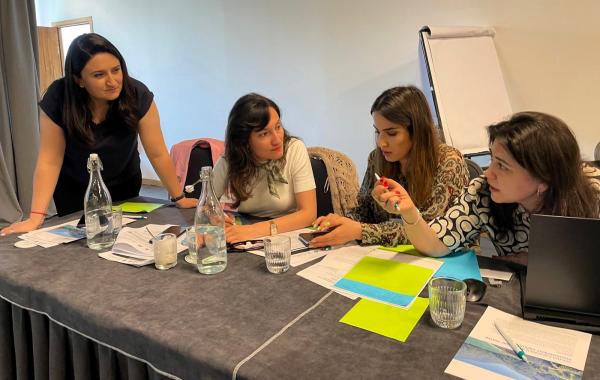South Caucasus Chapter of Women in Water Diplomacy:
Launch of Network Development Process
24 May 2024 by The Water Diplomat

In 2017, the Women in Water Diplomacy Network was launched to improve gender equality in high-level decision-making in transboundary basins and regions, focusing the initiative on women's leadership in regional dialogues around shared waters. This international initiative has already borne fruit, with the first network launched in the Nile Basin that same year, followed by a regional network in Central Asia/Afghanistan established in 2021, another in North America in 2023, and in the Orange-Senqu basin aiming to launch later this year.
At the end of April, an inception workshop was held to co-create a branch of the Women in Water Diplomacy Network in the South Caucasus region. The workshop held on April 26 and 27, 2024 in Tbilisi, the capital of Georgia, brought together 36 participants (including 8 online participants)) from the 3 countries of Armenia, Azerbaijan and Georgia. The workshop was organized by the Environmental Law Institute and Utrecht University, with support from the Netherlands Research Council (NWO) and the South Caucasus Regional Water Management Program (SCRWM) of the United States Agency for International Development (USAID). The workshop provided the occasion to officially launch the development process for the ‘Women in Water Diplomacy Network South Caucasus’.
The main objective of the workshop was “to examine the interconnections between women, water, peace and security in the South Caucasus, and to consider ways of supporting and enhancing women's participation in transboundary water-related decision-making processes at different levels”. This involved identifying barriers and levers, as well as decision-making modalities to improve women's presence and weight in transboundary water management exchanges, as well as opportunities for networking and sharing views.
This workshop was organized in a very particular context of peace negotiations between Armenia and Azerbaijan and was therefore more than appropriate to take place at this time. Some of the participants stressed the importance of this initiative, adding that this kind of space for dialogue was very rare and therefore much appreciated, given the context.
Among the various speakers, Annie Steel from USAID declared that “the network has the potential to make a real difference in the region”. For his part, Eric Viala, USAID coordinator of the South Caucasus Regional Water Management Program (SCRWM), expressed his satisfaction that “this is a fantastic entry point for bringing people together” and that stakeholders understand the benefits of cooperation. He believes that “women are the most capable of putting their egos aside to find a solution”.
Presentations and discussions drew heavily on feedback from other networks. Professor Susanne Schmeier from IHE Delft highlighted the role played by regional water management bodies in mitigating conflicts and creating de-escalation. In her closing remarks on the first day, Lilit Baghdasaryan of the Armenian Water Partnership encouraged participants to “embark on this important mission together, despite the challenges, remembering that water knows no borders and that there is strength in numbers”. She encouraged women experts to “rise above the region's political divisions and invest in peacebuilding through water”. The participants also stressed the need to involve women experts in water diplomacy, in order to strengthen cross-border cooperation in the water sector, and the need, finally, to foster diverse, respectful and cooperative inclusion, to build a sustainable community, aware of the region's complexity and capable of adapting to a dynamic region.
On this occasion, USAID announced the creation, through the SCRWM program, of a new small grant instrument for regional organizations working towards these commitments.
